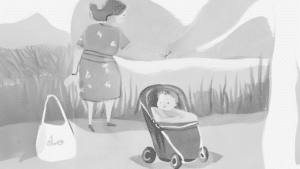This morning Andrew woke up in a sour mood. I noticed his brain’s relational circuits (RCs) were off and after several attempts to help him turn them on again, none of the normal solutions worked. His whining continued, even after I took some time to attune with his feelings and comfort him in his upset. Under normal circumstances, these two steps would help him shift into a relational mode again. These signs told me a rough morning was looming on the horizon – unless something quickly changed.
My husband and I have a “No-Whining” policy in our house. This means that any question asked in a whiny voice is an automatic “No” answer. When this happens, we remind the boys they still have the opportunity to change their tone of voice and try again. In most cases, this “Do-Over” works. However, on this particular morning, Andrew just could not get rid of the whiny voice.
I pointed out that in these moments of difficulty his brain’s relational circuits are off, and it’s hard to find his “strong voice” if he doesn’t get them back on. I offered to help by practicing appreciation or by doing one of the Shalom My Body exercises, but he refused. In this case, because my son is 5 years old and growing in Child Maturity, we have practiced these steps before so I decided to let him sit in his discomfort until he was motivated enough to have me join him in one of RC restoration exercises. (The strategy can be adjusted with younger children but Andrew is learning to do hard things and ask for what he needs.) After 30 minutes of waiting he was frustrated enough with the lack of response to his whining that he requested my help. Andrew asked if I would practice some appreciation with him, and I agreed.
We sat on the couch together and he snuggled next to me. We took turns talking about things that make us smile. I like to paint, so last year we painted a large tree with leaves to hang in his bedroom. On each leaf, we wrote something that makes him smile. We call this his “Appreciation Tree.” This morning we talked about some of the things he had written on the leaves such as throwing snowballs, listening to Daddy’s stories, playing on the playground, snuggling with Mommy, and more. After 5 minutes of talking about what makes him smile, we were both laughing, giggling and enjoying the benefits of returning to relational mode.
After an afternoon nap later in the day, Andrew woke up in non-relational mode. After just a few moments of talking about some of the appreciation leaves on his tree, he quickly returned to his relational self again. These moments of connection are a tremendous help for Andrew and I have observed that laughter is the key to helping 7-year-oldold son return to a relational mode when his RCs are off. I find it helpful to know the preferred solutions for each child.
Whenever our children lose access to their relational circuits, everything in life is harder, both for them and for us as parents. We can help younger children return to a relational mode when their RCs are off through attunement, sharing stories of appreciation or finding ways to giggle together. As children grow older, we can then teach them to identify and recognize the moments their RC’s are off and show them how to get relational again. This is a wonderful gift we can give children that they will use throughout life. For children as well as adults, our relational circuits are more likely to go off when we are hungry, tired, or even angry, so there are times some food or rest is needed.
What sorts of things cause you to go non-relational? What helps you shift back into relational mode again? These are topics worthy of much discussion with our families and friends

We Never Outgrow the Need to Receive
By Claudia Hendricks When we hear the word “infant” our mind instantaneously tends to dismiss the topic thinking it does not concern us as adults.








